Abstract
Consumer is the real king of the market. Though Bangladesh is a small country it contains a large number of consumers. But it’s the great matter of sorrow that every day and in every sector consumer right is violated. We have the law but there is no strong enforcement from the government agencies. The education of consumer and skills of sellers affects to get the rights of the consumer. A lot of organization works here for monitoring human rights situations but none are eligible for protecting consumer rights and that’s why consumer rights situation is not paid enough importance here. For this reason, first of all, the government should take proper steps to improve the condition of consumer rights.
Introduction
Protection of consumer rights is a great concern for Bangladesh but it is a matter of great sorrow that only one organization of government working on this great issue which named CAB ( Consumer Association of Bangladesh). As a law student, we know that the consumer is the king of the market. In developed country consumer get respect but in Bangladesh, they treated negligently. In almost every sector in Bangladesh consumer rights are violated every day in the life. Bangladesh adopted many Pakistan enacted laws and British laws and a lot of statues has been passed by our parliament after getting independence. But there has no specific law in Bangladesh for the protection of consumer rights. The Caretaker government passed an ordinance in related of consumer protection rights in Bangladesh in 2008. Due to this legal procedure of this act is not ‘consumer-friendly’. The Government organizations from executing a point of view are very weak. The discussion regarding consumer rights has a very dangerous situation. The customers are not concern about their rights. So it must be very useful and helpful for consumers, to make the new laws of consumer rights. Though there were few studies on this topic but to know deeply about this subject this study will help much more. Further, it will help to draw the attention of the government to this issue and to protect consumer rights.
History of Consumer Protection Laws in Bangladesh
In Indian civilization, Consumer Protection Laws has a very rich background because it was introduced in 3200 B.C.
In ancient India, Vedas as a religious text was properly followed by the most of the people in that period. There are several provisions which gave the direction for the benefit and safety of consumers and the punishment was allowed when any act has gone against the consumer rights. In Arthashastra another important ancient text directly explains about the penalty was imposed when the traders were involved in adulteration of goods as like grains, medicines, salt, sugar, perfumes, fruits etc. There were several punishments which delivered for different types of cheating, black marketing and unfair trade practices.
In the medieval period, like Hindu texts the Quran as a religious text also defined several rules and obligations for saving consumers from unfair and unjust practices of trade. During the rule of Alauddin Khilji, there has many injunctions and penalties enforced to control the market. He fixed prices of all kinds of goods and he established vey strict price control mechanisms in the market. Both Hindu and Muslim religious texts were being used together by different states of India to strongly delivered the protection of consumers.
In the modern period, the British established English Common Law in India and also make some legislation for the consumers and these legislations are as follows:
- The Indian Contract Act,1872
- The Sale of Goods Act,1930
- Indian Partnership Act,1932
- The Agriculture Produce ( Grading and Marketing) Act,1937
- The Drugs Act, 1940
- The Drugs and Cosmetic Act,1940 [1]
In Pakistan Period, there has also some legislation which was made by Pakistani rulers for the benefit of consumers and these legislations are given below:
- The Essential Commodity Act,1956
- The Food Grain Supply Ordinance,1956
- The Pure Food Ordinance,1959
- The Price and Distribution of Essential Commodity Ordinance,1970 2
Present Condition of Consumer Rights in Bangladesh
The Constitution of Bangladesh, under its ‘fundamental principles of state policy’ part recognizes the rights of consumers to a limited extent. The provisions of consumer protection can be found in Articles 15 and 18 of the Constitution. In 2004, a draft law on the protection of consumer rights was approved in the Cabinet of the Government of Bangladesh. The ability of consumers to verify the product information given to them is extremely limited and, in most cases, impossible to achieve. The current system of legal protection to the consumers in Bangladesh is inadequate and outdated. Further, whatever little laws are available; they are not strictly enforced for the protection of the rights of the general consumers. The consumers in Bangladesh are thus deprived of their rights at every sphere of their lives.3
Survey
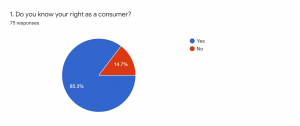
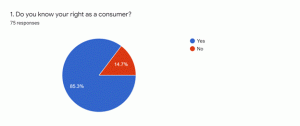
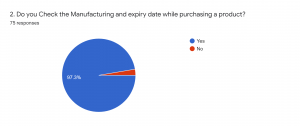
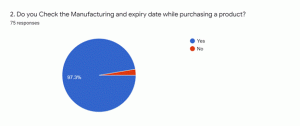
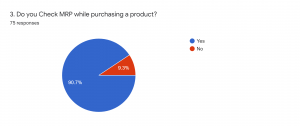
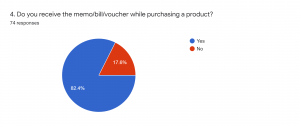
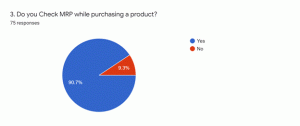
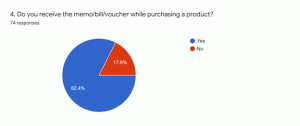
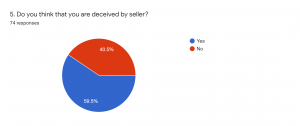
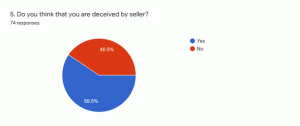
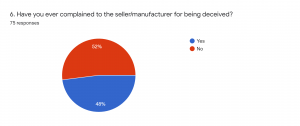
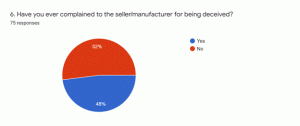
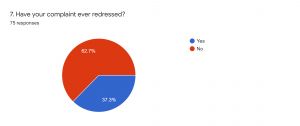

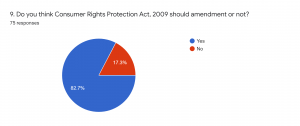
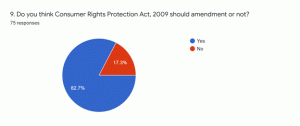
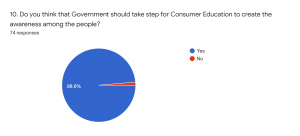
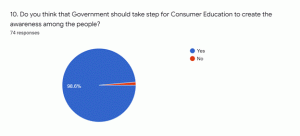
CRITICAL LOOKING INTO CONSUMER PROTECTION RIGHTS ACT, 2009
- The Act is not exhaustive
The most important obligation of the Act is that it is mostly a piece of legislation that deals with administrative matters. The Act contains 82 sections deals with the composition of the National Consumers Right Protection council and the National Consumers Rights Protection Directorate. Under Chapter II of the Act, it also prescribes for a specialized institution namely National Consumer’s Right Protection Council.4 In this Act, there has no guideline for consumer protection laws as it does not define their rights and it does not also describe how the citizens can empower themselves to ensure their rights as a consumer in this country.5 [2]
- The Act fails to take a Rights-Based Approach
This legislation lacks a right-based bottom approach which is the core feature of consumer protection legislation in other parts of the world particularly in developed countries where consumer protection is given immense importance by the state. The Act does define who is a consumer though with certain limitations but does not what their rights are. Rather it goes on to describe a list of ‘Anti-Consumer Rights Practices’. Therefore the applicability of the Act is narrowed down only to the offenses listed in Section 2(20) of the Act. Section 2(20) provides a list of Anti Consumer Practices, which are punishable to ensure rights guaranteed to the Consumers under the Act. Section 2(20) of the Consumer Rights Protection Act,2009 explains that the Act mainly deals with the problems of economic sectors and product safety rather than the consumer rights we care about. In this legislation, the provisions are not strong enough to give proper service to the consumers who claim compensation.
- a) to sell or offer to sell any goods, medicine or service at a higher price than the
fixed price under any Act or rules;
(b) to sell or offer to sell adulterated goods or medicine knowingly;
(c) to sell or offer to sell any goods containing any ingredient which is extremely injurious to human health and the mixing of which with any food item is prohibited under any Act or rules;
(d) to deceive consumers by untrue or false advertisement for the purpose of selling any goods or service;
(e) not to sell or deliver properly any goods or services promised to sell or deliver in consideration of money;
(f) to sell or deliver less quantity of goods than the weight offered to the consumers while delivering or selling any goods;
(g) to show more than the actual weight by the weight stone or any other weight measuring instrument used for measuring weight in selling or delivering goods in a commercial enterprise;
(h) to sell or deliver less quantity of goods From section 2(20) of Consumer Rights Protection Act,2009 it appears that the Act mainly deals with the obligations of economic operators and products safety rather than the consumer rights we care about.
- The Act fails to recognize Strict Product Liability Principle
Another major obligation of Act is that it does not provide any provision for strict liability for breaches of consumer rights. The doctrine of strict liability is now established standard in international law so far as it relates to consumer protection. The Act does not provide the international standard. Therefore the consumers in Bangladesh are far behind in protection their rights if compared with any developed countries. The consumers in this country still suffer from the application of maxim ‘Caveat Emptor’ or ‘buyers be aware’ which only rewards fraudulent and deceptive business but with the growth of trade and globalization this rule no longer is actual and is rejected by the developed countries. In absence of strict liability, the offenders can easily escape their liability by shifting the burden through contractual means with the means. The consumers of services in Bangladesh are left more confuse since the Act does not provide any direction as to unfair conduct or unfair contract terms.6 [3]
- Exclusion Clause and Protection of Consumers: Provisions in Bangladesh
We try to discover the material legal provisions though Bangladesh do not have specific legislation in this matter under which one may be recovered who borne loss from exclusion clause or unfair consumer contract. The oncoming discussion shall be based on the legal provisions of The Constitution of 1972, The Contract Act,1872, The Consumer Protection Act,2009 on the topic of how they deals with Unfair terms of contract and protection of consumers. These are given below:
The Constitution of 1972: According to Constitution of Bangladesh, Every person including a consumer should be entitled equality before law and should be treated without any kind of discrimination which are mainly guaranteed by article 27 and 28 along with article 29. We can also connect article 42 which is abolish to enjoy any unfair advantage above legal scheme because it provides a accuracy of the fact that every person has absolute right to deal with the property with his own condition except any restriction imposed by law.
The Contract Act,1872: Section 10 of the Contract Act,1872 provides the basic foundation of a very important point of “ Free Consent” of the contracting parties as mandatory. The exclusion clause may be found from section 17 and 18 which respectively talks about Fraud and misrepresentation. Section 17 also provides that mere silence is not fraud but unless there is a duty to speak. The broad and extensive power under the section 23 has given to the Bangladeshi courts may vest to vanguard to the consumers because this section provides a chance for invalidating contracts if the terms of such contract break any provisions of law or it the court finds them as immoral or against public policy.
The Consumer Right Protection Act, 2009: This legislation does not provide any single provision from which one can get any remedy relating to the exclusion clause or unfair contract terms in a contract. But possibly we related to section 2(20)(d) to the exclusion clause or unfair contract terms because it talks about the untrue or false advertisements to deceive the consumer on the purpose of selling any goods or service which is unable to fulfill the necessity of any consumer rights.7 [4]
- The Act fails to design an effective redress mechanism
Under this Act no complaint can be taken by the court without approval of the Director General of Consumer Protection Department.8 Therefore the practical execution is that only competent government officers are entitled to institute a case against violations of any provisions of any Act. The Indian Act provides a very effective redress mechanism in this respect and also other developed or developing countries. If this aggrieved consumers has faced difficulty to access the system, costs and etc. Considering the problems of costs associated with going to courts, the consumers would rather prefer to compromise or accept the violation of their rights for small claims like inappropriate price, deceptive packaging and branding, shortage of weights and measures or false information about goods and services. In this discussion it is relevant to refer the Indian Consumer Protection Act, 1986 which provides a quasi- judicial dispute resolution system for resolution of consumer’s complaint. The Indian Act also provides for consumer disputes through redress agencies. The Redress mechanism is one of the most significant which involves the consumer rights to receive compensation for misrepresentation of goods and unsatisfactory services. The redress mechanism is one of the wonderful systems to protect the consumer rights. Under this Act, it does not allow the Council or directorate to receive complaints directly from the consumers. In the view of Consumer Protection Rights Act, 2009 it can be criticized as making another bureaucratic mechanism which is largely ineffective and leaves the huge chances for corruption. The Act provides only for redress in usual civil courts in Bangladesh but in other developed countries they have a separate consumer court to dissolve the consumer matters. [5]
- Inadequate mechanism
Another obligation of this Act is that it put down a very observing role upon the Directorate. It directs that the Directorate will supervise the anti-consumer rights practices in the listed in this legislation however the Act does not provide any provision law how this is going to be executed. The office of the directorate has unsuitable institutional capacity to impose to observe the markets for consumer protection rights in Bangladesh. As a result, the Directorate of National Consumer Protection Rights in Bangladesh is yet to show any achievement for protecting the interest of the consumer in this country.9 In section 66 of this Act explains that Civil proceedings, you can file the case directly in the court and claim for remedy but in section 71 explains the criminal proceedings no one can directly file the case in the court. So, this is one kind of inadequate mechanism of this Act.
- No Guideline for E-Commerce and Mediation
In our legislation, there has no guideline for E- Commerce and Mediation system. In India and USA there has a system that court can suggest the parties to resolve their issue through settlement. In India, consumer can file complain from anywhere in the country in an online system into the court.
A COMPARATIVE OVERVIEW OF CONSUMER PROTECTION RIGHTS ACT, 2009
- This Act has no International Standard: In Consumer Protection Rights Act, 2009 there has no central regulator system but the new Act of India which is Consumer Protection Rights Act, 2019 there has introduced a Central Consumer Protection Rights Authority (CCPA).It is a separate regulator and like India, Sri Lanka and Nepal have also a separate regulator. This central regulator system of India have to face issues that connected to consumer rights, unfair trade practices, misleading advertisement and impose strict penalties for selling faulty and fake products. In the new Act of India a class action suit has been introduced in here which means that a group of consumers face a same nature of problem and filed a suit then central authority considers it as a class action suit.
- This Act has no guideline for E-commerce and Meditation: Our legislation in Bangladesh, there has no guideline for E-commerce and Mediation. There has no consumer court for filing the case and also there has no pecuniary judiciary system but in the new Act of India has added the system of pecuniary judiciary which means the ability of courts to take up cases depending on the values of the case of the consumer rights . This Act has also given the guideline for E- Commerce and Mediation. In Mediation system which means court can refer settlement through mediation and the guideline for E-Commerce provides that market platforms like Amazon, Flipkart etc will have to express their seller’s details, address, website and email etc and other conditions that connected to refund, exchange of money and warranty on their website to increase accountability.
- In this Act, Consumer Faces many difficulties to file their complaint to the court: In India, the Act gives a power to the consumers to file their complaints into the court from anywhere in the country and anyone can complain in an online system. In Bangladesh, consumer can only complain against the seller and faces very difficulty.
- In this act there has no guideline for strong product liability System: In India, the new Act added the product liability system which means consumers can complain against not only the seller but also against the manufacturer and service provider which means a manufacturer and service provider has to give compensation to the consumer for their poor services of goods and consumer can also complain against the Brand Ambassador who is renowned actor or sportsman has to give compensation to the consumers for the branding of fake products.10
- In Bangladesh there has no publicity for consumer movement: There has no funds for the publicity of consumer movement in Bangladesh but in USA there has a additional resources from the charitable organization and personal contributions as well for consumer movement. In the report of Royal Commission of Australian Government Administration made a recommendation for the establishment of specific neutral agencies to provide state assistance in relation to the publicity of consumer movement. In Philippine, they have passed a legislation which provides that the provision of the source of government support in connection with the consumer movement and its publicity and it also announces is that the government support is must for the consumer organization and consumer education. In the consumer rights law of Philippine, such economic support the consumer movement by removed from the taxes fixed on the immodest traders. 11
- In Bangladesh there has no specific guideline for criminal offences in the matter of consumer rights:[6]In Bangladeshi Consumer Rights Act has no specific legal provision for criminal offences in relation to consumer rights. The guidelines for product safety or product liability system in Consumer Protection Rights Act, 2009 has not matched with international standard. In Australia, a Product Safety website ‘A one stop shop’ has been introduced to provide consumers and business with access to regulatory action concerning the safety and the certain products and service.12 In Canadian Consumer Law clearly explains about the abovementioned matters such as if any purchasing contract says that a consumer cannot complain against any seller or supplier .
RECOMMENDATION
The recommendation which focus on how to protect the consumer’s rights and what will be the recommendations in perspective of Bangladesh. My recommendations are mentioning below:
- The government should provide strong, continuous leadership to develop a national board national consensus on improving the quality of consumer rights
- National aims for the improvement of consumer rights should be established, accompanied by appropriate, specific objectives for improvement
- An annual award for excellence in trade quality should be established
- Planning of a consumer education program
- Designing a legal framework for the achievement fair, accessible, efficient, a sustainable benefit for consumers generally
- a) Introducing a separate court for addressing consumer’s specific complaints
- b) Constituting a consumer complaint redress authority
- c) Giving permission to individual consumers to put their complaint directly to the police or criminal court
Need more voluntary organization - Increasing Mobile Court Operators
Later on, the developed countries’ legislation on Consumer Protection Rights has fulfilled all these kinds of recommendation the abovementioned here.
CONCLUSION
Protection of consumer rights is an important issue in Bangladesh. In the developed countries, consumers enjoy their full rights but in the developing countries and underdeveloped countries consumers rights are not protected since the majority of the consumers are illiterate about their rights and their voice is very low. Though it is the responsibility of a state to ensure the protection of the rights of its citizen, the government is very weak in this issue in Bangladesh. The consumers being the citizen of a state are entitled to be protected from the illegal business practices but due to widespread corruption at the policy making body, improper application of laws, disrespect of the government towards the consumer’s rights, absence of voice from the consumer organizations, and compromising attitude of the consumers, violation of consumer rights is high in the developing countries like Bangladesh. At this moment, all that necessity for the protection of the consumers’ rights are empowerment of consumer organizations, encouraging consumer movement and the political commitment from government to ensure consumer protection through exercising the consumer protection laws of Bangladesh. At the same time, these legal mechanisms pose a great legal challenge to the traditional courts which conduct litigation in orthodox ways. In this age of consumers, Bangladesh should go for specific legislation that directly provides a sound legal mechanism to protect consumers from inequality of bargaining power and unfair contract terms.
writer
Salman Bashar
Department of Law, East West University
1.Sonika Sekhar, The History of Consumer Protection.
2.Md. Abul Kalam Azad, Development of Consumer Protection in Bangladesh: A Empirical Study.Pg-16
3.Consumer Rights In Bangladesh: A Critical Study, Bangladesh Journal Of Legal Studies.
4.Consumer Protection Rights Act,2009
5.Dr. Rumana Islam, Critically looking into the Consumer Protection Rights Act, 2009, University of Dhaka,Pg-16
6.Dr. Rumana Islam, Critically looking into the Consumer Protection Rights Act, 2009, University of Dhaka
7.Adity Rahman Shah, A Comparative Study OF Common Law Jurisdictions on Exclusion Clause And Its Ramifications On Consumer Rights: Bangladesh Law In Context, Pg-194
8.Consumer Protection Rights Act,2009
9.Dr. Rumana Islam, Critically looking into the Consumer Protection Rights Act, 2009, University of Dhaka
10.Abrar Salam, Our Consumer Rights: An evaluation, Society For Legal Studies (SCLS)
11 . Legislation: The Australian Consumer Law.
12. The Consumer Protection Act- Canadian Legal FAQS
Follow my blog with Bloglovin
